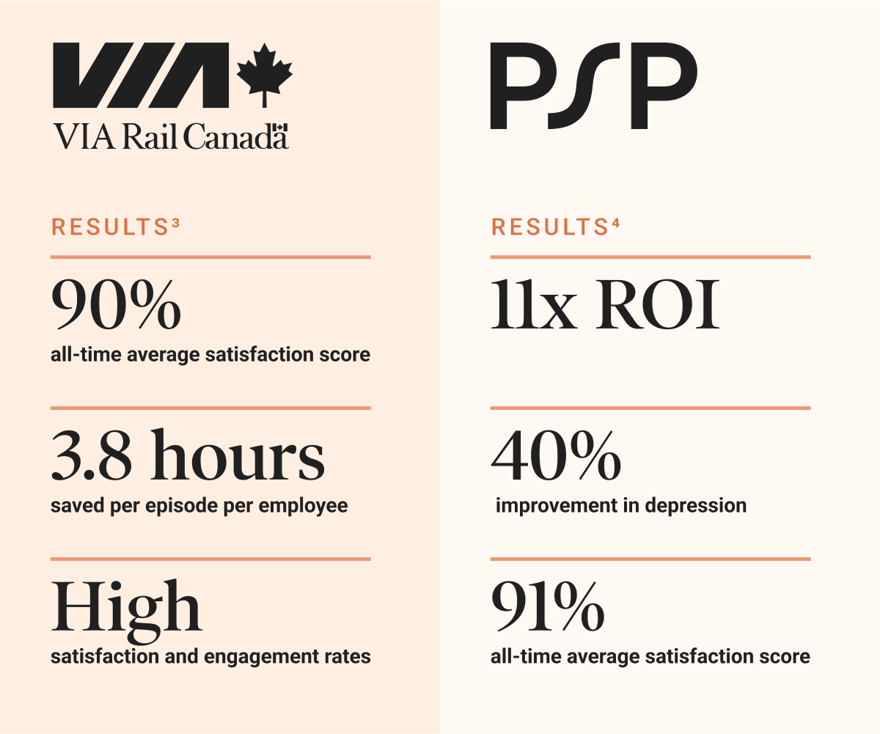Despite the considerable increase in organizational investments in mental health programs, mental health issues are on the rise. According to a recent survey, 45% of Canadians reported worsened mental health due to the pandemic. Successfully treating employee mental health begins with one crucial step: summoning up the courage to ask for help.
When employees do decide to look for support, there are many reasons why they may get cold feet and back out: they may not be aware of what benefits are available to them, or the stigma surrounding therapy may deter them from staying the course of needed intervention. Then, there’s the fact that 50% of Canadians have unmet mental health needs. Members may feel that support is insufficient, or prefer options other than in-person therapy (which can present inconvenient time slots or locations, and feel uncomfortable or intimidating).
These deterrents are why more and more business leaders are turning towards stepped care, a best-practice, evidence-based approach that helps organizations overcome rising mental health challenges in the workplace.
What is stepped care?
Stepped care is a holistic approach to treating mental health issues centred around the member and supporting them across a full spectrum of needs. The goal of stepped care is to provide the right form of intervention at the right time to each member, no matter what their issues or care preferences are.
With Dialogue’s Mental Health+ program, members have streamlined access to a comprehensive array of services to meet their needs over time and as they evolve along their mental health journey. It emphasizes integrating different levels of treatment, such as self-led and face-to-face therapy, into one program to maximize coverage across the care continuum. Offering treatment options that vary in intensity according to symptom severity and that address individual preferences for autonomy or practitioner guidance are key factors to broadening employee reach and driving organizational health outcomes quickly.
Supporting the continuum of care
A stepped care approach provides a spectrum of mental health services across the continuum of care. When it comes to employee mental health benefits, first-movers like Dialogue have already seen the positive outcomes associated with prevention-to-remission-to-recovery support.

The key to prevention and early intervention is fast, simplified access to support and quality information. At any point, Dialogue members can start their self-care journey with our internet-based cognitive behavioural therapy (iCBT) toolkits, or step up to a more intensive treatment such as virtual therapy and clinical assessment, and medication if needed. And regardless of the path they are on, they have access to resources to track their symptoms and monitor their progress, keeping a record of their wellness journey over time.
Once they are back on their feet, the goal is to ensure they stay this way. A recovery plan helps members continue to build upon what they’ve achieved during treatment and prevent relapse through self-led exercises and by regularly monitoring symptoms through standard assessments, like the General Anxiety Disorder-7 (GAD-7) and Patient Health Questionnaire-9 (PHQ-9) questionnaires.
Being flexible to member preferences
Mental health support does not always have to take the traditional form of communicating with a professional.
73% of Canadians would use self-led resources and tools to guide them through their needs if they were available through their benefits program.
Members seeking professional intervention to get through a rough patch may not necessarily be ready to take immediate next steps or begin their treatment plan.1 Stepped care acknowledges that reality by recommending the least intensive options that are clinically and appropriately suited to the member’s issue. Factoring the member’s preference into treatment options improves the odds of them seeing their care plan through to remission and increases their willingness to consider more intensive support down the line if they need it.
Focusing on health outcomes
Mental health claims are the fastest growing segment for short- and long-term disability leaves. The pandemic played a big part in this increase, having put immense strain on the mental healthcare system, with 39% of Canadians claiming they had to wait 8 days or more before receiving mental health support in 2021. Because of the complexity of mental illnesses, they tend to take longer to treat: mental health-related short- and long-term disability claims only represent 24% and 32% of all claims respectively, yet amount to 45% of all claim costs.2
Presenteeism (showing up for work when unwell), absenteeism (taking sick days or spending time away from work to attend appointments), and leaves of absence all have a significant negative impact on an organization’s work output and bottom line. A stepped care program like Dialogue’s Mental Health+ offers 360-degree support for its members, empowering them to proactively manage their mental health at any time, resulting in healthier, happier, and more productive employees.
Dialogue’s fast, simplified access to a multidisciplinary team of mental health professionals and clinically proven resources have helped organizations reduce disability costs, shorten leaves of absence, and improve average recovery rates. In fact, our programs reduce short-term disability to less than 6 weeks in 70% of cases (compared to a Canadian average of only 30%), which means:
-
Your employees are 230% more likely to recover more rapidly.
-
Your employees are 2.3 times more likely to require a shorter disability leave (under 6 weeks).
Dialogue’s mental health program has not only been a proven catalyst in improving our members’ well-being, but in optimizing our clients’ financial investment, too, by way of a 5x ROI.
The future of mental health lies in a stepped care approach
Dialogue supports millions of Canadians across more than 25,000 organizations. Our Mental Health+ program helps organizations:
-
reduce absenteeism;
-
decrease mental health-related costs (like disability claims); and
-
improve employees’ quality of life.

See Dialogue’s Mental Health+ program in action and discover how it can help the well-being of your organizational members. Let's discuss what Dialogue can do for your business.
Sources
-
Changing times: evolving the approach to disability management
-
Improving Via Rail’s organizational well-being for workers at the office and on the tracks
-
Elevating PSP Investments’ employee well-being in Canada with Dialogue’s Integrated Health Platform™




 Canada (EN)
Canada (EN)
 Global (EN)
Global (EN)








